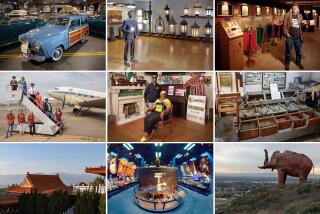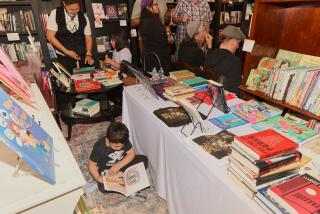Harold Patton, Collector of African American Books, Dies
- Share via
If you hung out at independent bookstores like Esowon in Inglewood, Dutton’s in Brentwood or the Midnight Special in Santa Monica, you might have noticed an older African American man in corduroy slacks and patch-sleeve jacket who wore his silver hair in a ponytail.
Toting a briefcase and a worn leather journal, he went to every book-signing by a black author that he could. Often, he was the only person in line for an autograph. Hours later he might still be there, engaged in lusty book talk with other customers.
Eventually, Harold Lloyd Patton would take his new books home to Studio City. There, in a hand-built library above the garage, he kept the collection of a lifetime: thousands of books spanning the written history of African Americans, from 17th century poetry by former slave Phillis Wheatley to late 20th century novels by Terry McMillan.
Patton, who was 71 at his death from cancer April 19 at a Burbank hospital, accumulated what is believed to be one of the largest private collections of African American literature in the country. He owned an estimated 20,000 volumes, among which are rare first editions of works by such authors as Zora Neale Hurston, Jean Toomer, James Baldwin and Langston Hughes.
The onetime stage manager for singer Ray Charles had “a reverence for creativity and the written word,” said friend and Inglewood bookseller C. Edward Moondance. “Black literature meant something to him.”
Born in San Bernardino, Patton was a star athlete in high school whose hopes for a football scholarship were dashed after he dislocated his shoulder. His family believes that he developed a love of books from his father, Dave, a well-read man who ran a general store in Santa Barbara and was a political activist.
After attending community college in Ventura, Patton held a variety of jobs. For the last several years, he had been a storeroom manager for the Bicycle Club casino in Bell Gardens.
His bibliomania, however, was best served by the 16 years he spent working for Charles. As the singer’s stage manager from the late 1960s through the early 1980s, Patton traveled the globe. “Everywhere he went,” his wife, Emily, said, “he sent boxes of books home.”
Patton began collecting as a child, starting with the “Little Big Books” series. In his teenage years, he was a denizen of Santa Barbara’s better bookshops, said a former Santa Barbara High School classmate, Pulitzer-Prize winning UC Berkeley historian Leon F. Litwack.
Patton began focusing on black literature during the 1950s, when he spent a few months living in Paris and met Baldwin. The collector was captivated by the idea of preserving the written legacy of African Americans.
One day several years ago, Litwack, who collects works of black history, was browsing at a bookshop in New York that specializes in African American literature when the proprietor asked him if he knew a man named Harold Patton.
Although Litwack had been out of touch with his old schoolmate, he said, “ ‘Of course, I know Harold Patton.’ That’s when I learned he was a major collector. . . . and that we had been competing for some of the same books.”
Litwack later made a date for a reunion and saw the works Patton had amassed.
“It’s a marvelous collection,” Litwack said. “What makes it particularly unique is [that] he had a real sense of up-and-coming black writers. He also collected vanity press books, any literary work by a black author. His collection in that sense is very strong and unique.”
The oldest book in the collection is Wheatley’s “Poems on Various Subjects,” published in 1773. An illustration of the author at the beginning of the slim volume identifies her as “Negro servant to Mr. John Wheatley,” a Boston tailor. Wheatley began writing verse when she was 13 and published her first poems in 1770, but the 1773 book was her first bound volume.
Other prized holdings in Patton’s collection include “Color,” the first book by Harlem Renaissance writer Countee Cullen; a signed first edition of Baldwin’s “Go Tell It on the Mountain”; a first edition of Ralph Ellison’s “Invisible Man”; and many works by Paul Laurence Dunbar, including an 1893 copy of “Oak and Ivy,” Dunbar’s first book of poetry.
When Patton wasn’t reading or cataloging his books, he was scouting for new ones. He had a habit of gathering up family members to attend book-signings and sometimes attended four events a week.
“Of course, we always got left in the dust once he started talking to the author,” said daughter Deborah Woods, one of Patton’s seven children. He also is survived by 13 grandchildren and 10 great-grandchildren.
His family plans to maintain and expand his collection and perhaps create a foundation or museum that will enable them to make it available to the public.
One of the centerpieces of the display might be a book called “Authors I Have Known,” the title Patton had engraved on a leather-bound journal he often carried to signings and lectures. Close to 200 authors signed it, including Baldwin, McMillan, Alex Haley, Octavia Butler, Gwendolyn Brooks, bell hooks, Maya Angelou and Barbara Chase-Riboud. Many of the inscribers thanked him for supporting them.
“I always thought the book should be called ‘Authors Who Have Known Harold,’ ” said Moondance. “He was the link between them.”
More to Read
Sign up for our Book Club newsletter
Get the latest news, events and more from the Los Angeles Times Book Club, and help us get L.A. reading and talking.
You may occasionally receive promotional content from the Los Angeles Times.









